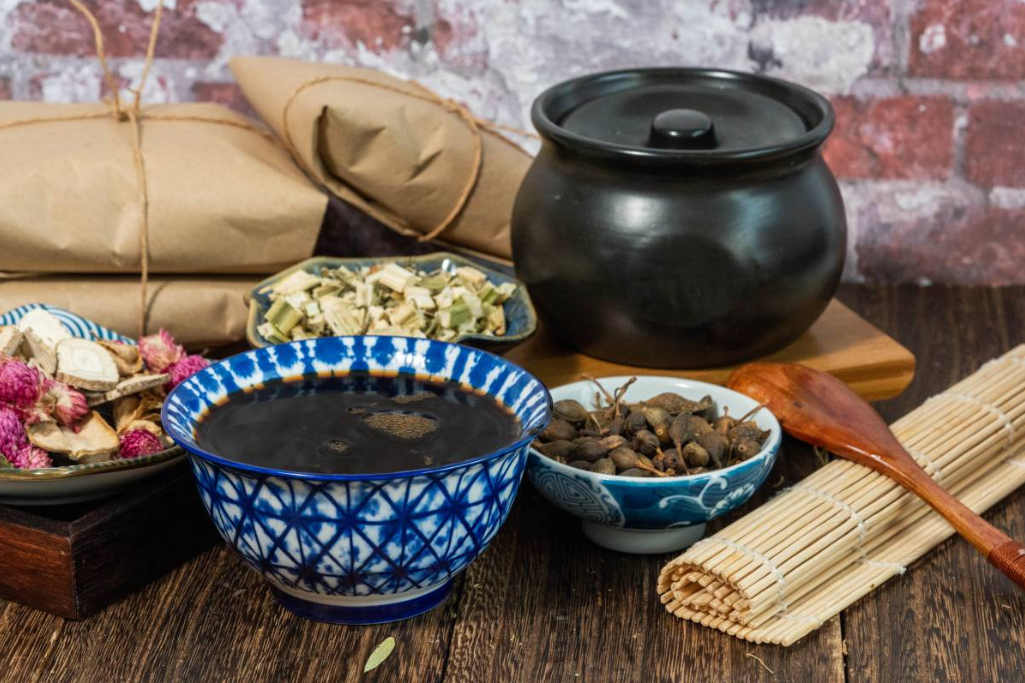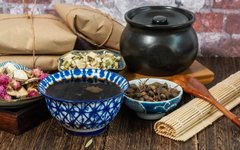
1
Qi stagnation syndrome (qì zhì zhèng) refers to a pathological state where the flow of Qi is obstructed and stagnant.
The incidence of Qi stagnation syndrome is highest among middle-aged and elderly individuals, who often experience symptoms such as chest tightness, pain, or a feeling of fullness, with fullness being more prominent than pain and symptoms fluctuating.
Different locations exhibit different symptoms; for example, food accumulation (shí jī) can lead to abdominal distension, causing a feeling of fullness and pain in the stomach area;
if it is due to liver Qi stagnation (gān qì yù zhì), there may be a sensation of wandering pain;
if Qi stagnation occurs in the meridians or muscles, the clinical symptoms may vary, such as weakness or tightness in the limbs.
Patients with Qi stagnation syndrome can benefit significantly from taking Si Mo Tang (Four Milled Decoction) oral liquid.
Traditional Chinese Medicine (TCM) believes that Qi stagnation is primarily caused by emotional distress, or by obstructions from phlegm, dampness, food accumulation, heat, or blood stasis;
or due to dysfunction in the organs, such as the liver failing to disperse Qi or the large intestine failing to transmit, leading to local or systemic Qi stagnation, which in turn causes dysfunction in certain organs or meridians.
The Huangdi Neijing (Yellow Emperor’s Inner Canon) states: “Qi is the commander of blood; when Qi flows, blood flows; when Qi stagnates, blood stasis occurs.”
Qi stagnation and blood stasis can lead to numerous diseases. Therefore, the treatment of Qi stagnation syndrome should focus on promoting Qi flow.

2
Si Mo Tang oral liquid has excellent effects in promoting Qi flow, reducing counterflow, and alleviating pain, and can comprehensively enhance and regulate digestive functions, effectively treating patients with liver Qi stagnation and counterflow symptoms.
This includes symptoms such as post-meal fullness, early satiety, belching, loss of appetite, upper abdominal pain, heartburn, acid reflux, nausea, and vomiting.
For regulating such gastrointestinal issues, Si Mo Tang oral liquid is also a great choice.
Whether used alone or in combination with acupoint application, Dan Zhi Xiao Yao San (Dan Zhi Free and Easy Wanderer Powder), etc., it has shown good efficacy.
Si Mo Tang oral liquid is derived from the Song Dynasty’s Yan Yonghe’s “Ji Sheng Fang” and consists of four medicinal ingredients: Wu Yao (Lindera aggregate), Bing Lang (Areca catechu), Chen Xiang (Aquilaria sinensis), and Ren Shen (Ginseng).
Wu Yao, Chen Xiang, and Bing Lang are all effective in regulating Qi.
Bing Lang breaks Qi and reduces counterflow; Chen Xiang promotes Qi flow, reduces counterflow, and assists the kidneys in receiving Qi; Wu Yao disperses liver Qi, relieves depression, promotes Qi flow, and alleviates pain.
With these three herbs, the Qi mechanism is regulated smoothly.
Ren Shen serves as a supplement, playing a role in tonifying Qi and supporting the body’s upright Qi.
It promotes Qi without depleting it, balancing both pathogenic and upright Qi.
Si Mo Tang has been modified by practitioners into the current Si Mo Tang oral liquid, which is widely used in clinical practice.
It is primarily used for middle-aged and elderly patients with Qi stagnation and food accumulation syndrome, infants with food stagnation, and to promote recovery of gastrointestinal function after abdominal surgery.
Due to the incomplete development of the digestive system, infants are prone to digestive diseases.
Common conditions include indigestion and functional constipation, which may also present with symptoms such as loss of appetite, abdominal distension, and abdominal pain.
Currently, the clinical use of Si Mo Tang oral liquid for treating functional dyspepsia in children has shown high safety and clinical efficacy.
Research indicates that Si Mo Tang oral liquid also has good efficacy for postoperative gastrointestinal discomfort and recovery of gastrointestinal function (not limited to digestive system surgeries).
Si Mo Tang oral liquid has also been used to treat habitual constipation in the elderly, constipation caused by cancer chemotherapy, and abdominal distension in chronic obstructive pulmonary disease.
The above is for reference only; please consult a physician for guidance in regulation.

Reviewed by: Pharmacist Lu
Edited by: San Qi Xiao Mei
Return to the main pageReply with any keywords
to view the corresponding articles
| Back Diagnosis | Face Diagnosis | Tongue Diagnosis | Sweat Diagnosis | Eye Diagnosis | Differentiation |
| Gua Sha | Cupping | Moxibustion | Acupoint Pressing | Foot Therapy | Meditation |
| Tapping | Stretching | Veins | Nails | Acne | Stones |
| Liver Cirrhosis | Home Feng Shui | San Fu Tie | Vinegar Soaked Eggs |
| Tips | Tests | Winter Disease Summer Treatment | Self-Healing |

